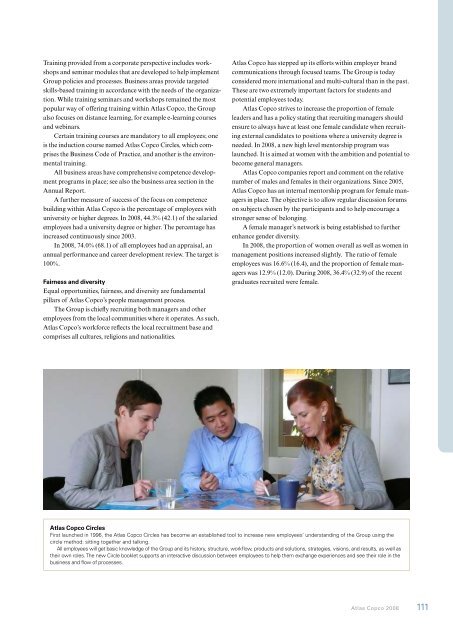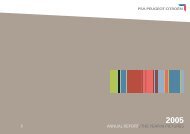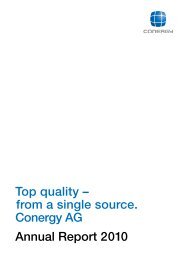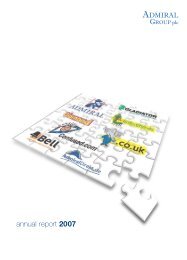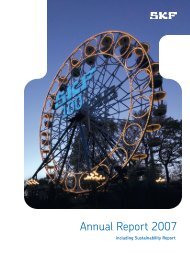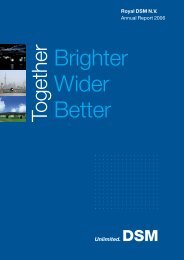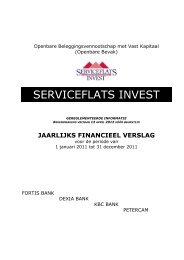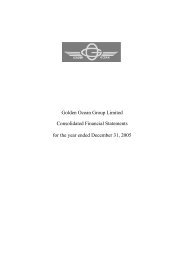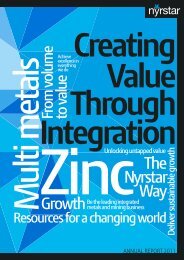Atlas Copco 2008 â tough ending to a record year Annual Report ...
Atlas Copco 2008 â tough ending to a record year Annual Report ...
Atlas Copco 2008 â tough ending to a record year Annual Report ...
You also want an ePaper? Increase the reach of your titles
YUMPU automatically turns print PDFs into web optimized ePapers that Google loves.
Training provided from a corporate perspective includes workshopsand seminar modules that are developed <strong>to</strong> help implementGroup policies and processes. Business areas provide targetedskills-based training in accordance with the needs of the organization.While training seminars and workshops remained the mostpopular way of offering training within <strong>Atlas</strong> <strong>Copco</strong>, the Groupalso focuses on distance learning, for example e-learning coursesand webinars.Certain training courses are manda<strong>to</strong>ry <strong>to</strong> all employees; oneis the induction course named <strong>Atlas</strong> <strong>Copco</strong> Circles, which comprisesthe Business Code of Practice, and another is the environmentaltraining.All business areas have comprehensive competence developmentprograms in place; see also the business area section in the<strong>Annual</strong> <strong>Report</strong>.A further measure of success of the focus on competencebuilding within <strong>Atlas</strong> <strong>Copco</strong> is the percentage of employees withuniversity or higher degrees. In <strong>2008</strong>, 44.3% (42.1) of the salariedemployees had a university degree or higher. The percentage hasincreased continuously since 2003.In <strong>2008</strong>, 74.0% (68.1) of all employees had an appraisal, anannual performance and career development review. The target is100%.Fairness and diversityEqual opportunities, fairness, and diversity are fundamentalpillars of <strong>Atlas</strong> <strong>Copco</strong>’s people management process.The Group is chiefly recruiting both managers and otheremployees from the local communities where it operates. As such,<strong>Atlas</strong> <strong>Copco</strong>’s workforce reflects the local recruitment base andcomprises all cultures, religions and nationalities.<strong>Atlas</strong> <strong>Copco</strong> has stepped up its efforts within employer brandcommunications through focused teams. The Group is <strong>to</strong>dayconsidered more international and multi-cultural than in the past.These are two extremely important fac<strong>to</strong>rs for students andpotential employees <strong>to</strong>day.<strong>Atlas</strong> <strong>Copco</strong> strives <strong>to</strong> increase the proportion of femaleleaders and has a policy stating that recruiting managers shouldensure <strong>to</strong> always have at least one female candidate when recruitingexternal candidates <strong>to</strong> positions where a university degree isneeded. In <strong>2008</strong>, a new high level men<strong>to</strong>rship program waslaunched. It is aimed at women with the ambition and potential <strong>to</strong>become general managers.<strong>Atlas</strong> <strong>Copco</strong> companies report and comment on the relativenumber of males and females in their organizations. Since 2005,<strong>Atlas</strong> <strong>Copco</strong> has an internal men<strong>to</strong>rship program for female managersin place. The objective is <strong>to</strong> allow regular discussion forumson subjects chosen by the participants and <strong>to</strong> help encourage astronger sense of belonging.A female manager’s network is being established <strong>to</strong> furtherenhance gender diversity.In <strong>2008</strong>, the proportion of women overall as well as women inmanagement positions increased slightly. The ratio of femaleemployees was 16.6% (16.4), and the proportion of female managerswas 12.9% (12.0). During <strong>2008</strong>, 36.4% (32.9) of the recentgraduates recruited were female.<strong>Atlas</strong> <strong>Copco</strong> CirclesFirst launched in 1996, the <strong>Atlas</strong> <strong>Copco</strong> Circles has become an established <strong>to</strong>ol <strong>to</strong> increase new employees’ understanding of the Group using thecircle method: sitting <strong>to</strong>gether and talking.All employees will get basic knowledge of the Group and its his<strong>to</strong>ry, structure, workflow, products and solutions, strategies, visions, and results, as well astheir own roles. The new Circle booklet supports an interactive discussion between employees <strong>to</strong> help them exchange experiences and see their role in thebusiness and flow of processes.<strong>Atlas</strong> <strong>Copco</strong> <strong>2008</strong> 111


